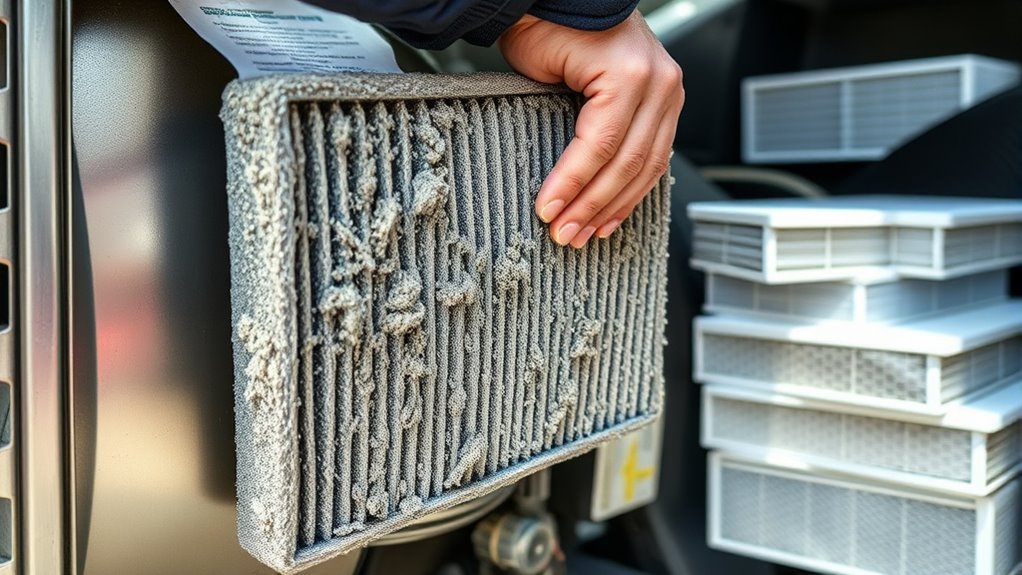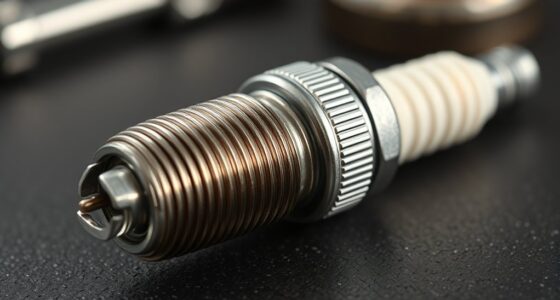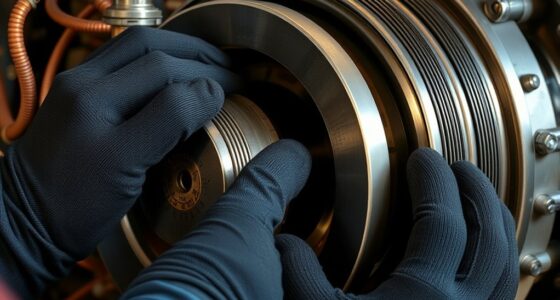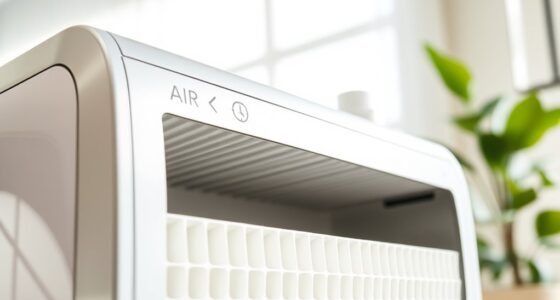To keep your generator running smoothly, regularly clean or replace its air filters—check them at least every 50 hours of use or sooner in dusty environments. Clean foam filters with soap and water, and replace paper filters when dirty or worn. Proper maintenance prevents dirt from entering the engine, avoiding costly damage and improving performance. Stay proactive with filter care, and you’ll guarantee ideal airflow and reliability. Continue with this guide to learn detailed steps for best results.
Key Takeaways
- Inspect the air filter every 50 hours of operation or more frequently in dusty environments.
- Clean foam filters with soap and water; replace paper filters when they are dirty or damaged.
- Always use the recommended filter type for your generator to ensure proper fit and filtration.
- Regularly check for dirt, debris, or oil buildup and replace or clean the filter as needed.
- Proper maintenance prevents dirt entry, reduces fuel consumption, and extends engine lifespan.

Are you ensuring your generator runs smoothly when you need it most? One of the simplest yet most critical steps is proper air filter maintenance. The air filter plays a vital role in maintaining healthy generator airflow, which directly impacts performance and longevity. When the air filter becomes clogged or dirty, it restricts the amount of air entering the engine, leading to reduced efficiency, increased fuel consumption, and potential overheating. Regularly inspecting and cleaning your air filter ensures your generator operates at peak performance and avoids unexpected breakdowns.
Regularly inspect and clean your generator’s air filter to ensure optimal performance and prevent costly repairs.
To keep your generator airflow unobstructed, you should check the air filter at least every 50 hours of operation or more frequently if you’re working in dusty or polluted environments. Removing the filter is straightforward—consult your user manual for specific instructions, but generally, you’ll need to open the air filter housing. Once exposed, examine the filter for dirt, debris, or oil buildup. If it looks dirty or clogged, it’s time for cleaning or replacement. Cleaning is often simple; many foam filters can be washed with soap and water, then thoroughly dried before reinstalling. For paper filters, however, cleaning isn’t an option—they should be replaced if contaminated.
Proper air filter maintenance not only keeps your generator airflow clean but also extends the lifespan of your generator’s engine. When you neglect this task, dirt and debris can enter the combustion chamber, causing wear and tear on internal components. Over time, this can lead to costly repairs or even complete engine failure. Regular maintenance, including filter replacement, helps ensure your generator remains reliable and efficient. By staying vigilant and maintaining a clean air filter, you ensure your generator remains reliable, especially during power outages or critical operations.
Replacing the air filter when needed is equally important. Even if it looks somewhat clean, filters have a limited lifespan and will eventually lose their ability to filter effectively. Using subpar or dirty filters can compromise your generator’s performance, so don’t hesitate to swap out old filters for new ones. Always use the recommended filter type for your model to guarantee proper fit and function.
In addition to regular maintenance, always keep an eye out for signs that your air filter needs attention, such as reduced power output, unusual engine sounds, or increased fuel consumption. By staying proactive with air filter maintenance, you safeguard your generator’s airflow, optimize its performance, and ensure it’s ready to serve you whenever you need it most.
Frequently Asked Questions
How Do I Identify a Clogged Air Filter Visually?
You can identify a clogged air filter through a visual inspection by checking for dust accumulation and debris buildup on the filter surface. If the filter appears dark, heavily coated with dust, or visibly dirty, it likely needs to be cleaned or replaced. Regularly inspecting your filter helps guarantee proper airflow, preventing engine strain and maintaining ideal generator performance. Don’t forget to handle filters carefully to avoid damaging them during inspection.
Can Using the Wrong Filter Damage My Generator?
Using the wrong air filter type can definitely damage your generator. For example, installing an incompatible filter might restrict airflow or cause dirt buildup, leading to engine strain. Always choose the correct filter based on your generator’s specifications and follow the recommended replacement frequency. Neglecting this can cause overheating, reduced efficiency, or even costly repairs, so double-check filter types and stay consistent with replacements to keep your generator running smoothly.
Are There Eco-Friendly Options for Replacement Filters?
Yes, eco-friendly filters are available for your generator. Look for filters labeled as eco-friendly or made from sustainable materials, which help reduce environmental impact. These sustainable filtration options often use biodegradable or recycled components, making them a better choice for the environment. By choosing eco-friendly filters, you support sustainability while maintaining ideal generator performance. Always verify compatibility to ensure your generator runs smoothly with these environmentally conscious alternatives.
How Does Filter Maintenance Affect Generator Noise Levels?
When you maintain your air filter properly, it directly impacts your generator’s noise levels. A clean filter extends its lifespan and reduces strain on the engine, leading to quieter operation. Regularly replacing filters follows noise reduction strategies, minimizing rattling or loud exhaust sounds. Keeping filters clean guarantees smoother airflow, which helps your generator run quietly and efficiently, creating a more comfortable environment while preventing unnecessary wear and tear.
What Are Signs of a Failing Air Intake System?
Imagine your generator suddenly stalls during a power outage—that’s a sign of a failing air intake system. You should regularly perform an air intake inspection and adhere to your filter replacement schedule. Signs include reduced engine performance, unusual noises, or increased fuel consumption. If you notice these issues, act quickly to clean or replace the filters, ensuring your generator runs smoothly when you need it most.
Conclusion
Regularly cleaning or replacing your generator’s air filters isn’t just about maintenance; it’s about ensuring reliable performance when you need it most. Some believe that neglecting filters doesn’t impact efficiency, but studies show clean filters can improve fuel economy and extend your generator’s lifespan. Don’t overlook this simple step—think of it as a small investment with big rewards. Keeping filters in top shape truly makes a difference, especially during critical power needs.









